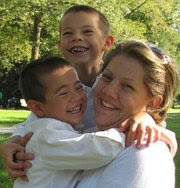Prior to having the diagnosis in hand, I had done my research. I knew that surgery to remove the tumor was by far the best option for treatment. The initial neuroendocrinologist I met with in Boston concurred.
Thankfully, a good friend of ours is a surgeon. He had been working at Children's Hospital in Boston and had relocated to the Washington D.C. area just weeks prior to my having been diagnosed. He said he would ask around and find the surgeon most highly qualified for the specific type of surgery I needed.
Shortly after, he contacted us with a name, and had already sent a letter to the surgeon on my behalf. The surgeon most highly recommended was Dr. Edward Laws. He was internationally known as the top pituitary tumor surgeon, having performed more than 5000 pituitary surgeries, more than any other surgeon in the world. Given that my research had clearly shown that the outcome of this delicate surgery was highly dependent on the skill and experience of the surgeon, this was the guy I wanted. Miraculously, he was in Boston.
It was then that we began to experience God's hand in what would be a surreal several months.
Within a few short weeks, in early December, I was able to meet with the surgeon thanks to the letter sent on my behalf. He evaluated the MRI and the hormone levels, in conjunction with the symptoms. He agreed that surgery was the best option. We very much liked him and he was highly confident that surgery would be successful. He wanted me scheduled for surgery right away.
At the time, Dan was essentially without a job and we feared not having health insurance to cover the surgery. With Christmas around the corner, we reluctantly scheduled surgery for mid-January. In many ways, brain surgery was the least of our worries last year. Christmas came and went. There was no Christmas tree, there were no lights. Just packed moving boxes, and memories of years past. We didn't dare dream of what the years ahead may bring. We inched forward, one day, one step at a time.
The day of surgery arrived. We had brought the kids to my parents the day before, and I was up early making sure all the bills were paid and things were ready. There was a knock at the door. I asked Dan to get it, knowing that it was Brian, his good friend from college. Dan hadn't wanted to ask anyone to be with him the day of surgery but I didn't want for him to be alone, especially should something have gone wrong. I had emailed Brian, asking if he would come. He agreed, and drove up from Connecticut to be at our house by 4am to surprise Dan and to travel with us in the snow to the hospital. Dan was relieved to see his friend; his brother. We arrived at the hospital at 5am, surgery was scheduled for 7am.
That snowy January morning was peaceful, albeit a bit sad. We knew the surgery was necessary, and had been told plainly that without it I would likely die before age 50 of complications of the disease. We knew the chances of a successful surgery were highly in our favor, but the surgery was not without great risk. We had prayed that God's will be done. We trusted that our sovereign God would do what was best, for his glory. We knew that God's will may not have been for me to return home...
All prepped for surgery and waiting with Dan and Brian, Dan's friend Steve, a nurse, arrived. He had gotten there early to surprise Dan and spent the day also.
The anesthesiologist arrived. She gave her little speech about what she would do, and asked if I had concerns. I simply told her, with a smile, that "I have an irrational fear of vomit", so to go ahead and give me the anti nausea medicine so as to prevent a reaction from the anesthesia. Everyone laughed. She commented on how calm we all seemed. That was the last I remember, other than an intimidating glimpse of the operating room.
For the next hours, I underwent endoscopic transsphenoidal surgery (surgery performed through the nose and sphenoid sinus to reach the pituitary).
This part of the brain was among the hardest to reach, but recent technology allows the surgeon to perform this surgery with the use of microscopic lights, cameras and instruments inserted through the nose with great accuracy. The surgeon watches what he's doing on a large TV, as he cuts through the sphenoid bone and accesses the tumor at the base of the brain.
In my case, the tumor was hanging on the carotid artery, attached also to the pituitary gland, just mere millimeters from the optic nerve.
As I was rolled into surgery, into the bright and sterile operating room I was praying that God would not allow the surgeon to sneeze.
When I awoke hours later in the recovery room, I was first thankful to be alive (God must have answered that one last prayer). I opened my eyes for a brief moment, just long enough to realize I had not lost my eyesight. Death and blindness the most obvious and immediate risks.
Someone told me as I was beginning to wake that the surgery was successful. The surgeon had removed the tumor, and my pituitary gland was intact. Great news, as that meant neither radiation nor hormone replacement therapy would be necessary. I could hear Dan's voice. I felt as though I'd been hit by a mack truck, yet was joy-filled for grace enough to live another day.
After a week in the hospital, I was discharged and instructed sternly to lift nothing heavier than a loaf of bread for eight weeks. This proved slightly difficult with a very large 18 month old, and needing to pack for an upcoming move.
In the days that followed, the risk of diabetes insipidus, carotid artery damage, cerebral spinal fluid leak, meningitis, and excessive bleeding remained, but lessened with each passing week.







No comments:
Post a Comment